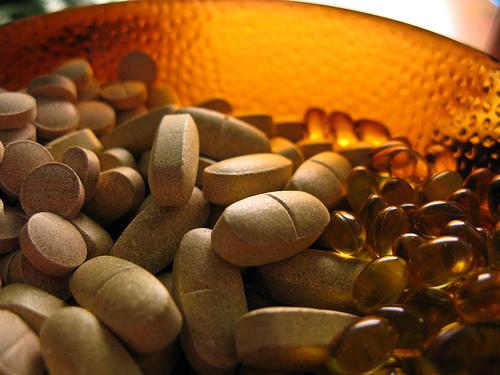This list of supplements might be useful if you are struggling with focus, memory, anxiety or sleep issues. Please remember that you should always consult your healthcare provider before using a supplement, as some supplements may have side effects and could interact with medicines you may be taking.
The information below is provided as general educational information only and should not be construed as medical advice or care.
If you would like to learn more about supplements that affect brain function, I recommend you read Mind Boosters, by Dr. Ray Sahelian. You might also want to check out: Change Your Brain, Change Your Body, by Dr. Daniel G. Amen; The Better Brain Book, by Dr. David Perlmutter; and The Mood Cure, by Julia Ross.
Supplements for focus and memory
- Acetyl-l-carnitine (ALC)
- B vitamins
- Coenzyme Q-10
- Fish oil (DHA)
- Ginko Biloba
- Zinc
- Choline
- DMAE
- Sage
Acetyl-l-carnitine (ALC) increases energy in the brain which helps enhance memory and concentration. ALC works by allowing essential nutrients to get into mitochondria to create energy. In addition to its central role in cellular energy production, ALC helps remove toxins from mitochondria to keep them functioning at optimal levels. Studies have shown that long-term use of ALC slows the progress of Alzheimer’s Disease. Recommended dosage for adults is 500 mg twice a day. Within an hour or two of taking ALC, a typical response is to feel increased arousal and vigilance as well as mood improvement. These effects can last all day.
B vitamins. This complex of vitamins is important to the functioning of the nervous system and neurotransmitters in the brain that affect mood and thinking. Therefore it is important to ensure that you have proper intake of B vitamins in stressful and anxiety-inducing situations, such as preparation for the bar exam. Vitamin B6 is necessary for proper nervous system and brain function. Low levels of vitamin B-12 can result in confusion and depression. B12 is also needed to help control inflammation in the brain. Therefore is recommended that you take a B complex vitamin each day containing at least 50 mg of B6 and 500 mcg of B12. Be careful about taking a big dose of B vitamins in the afternoon or evening as it can cause agitation and interfere with sleep.
Coenzyme Q-10 is critical for brain health, and Dr. Perlmutter recommends that everyone takes it. There is a growing consensus among the scientific community that loss of Q-10 in the body as we age causes a decline in mental function. Coenzyme Q-10 is involved in the production of energy in the mitochondria, and because the brain is one of the most energy-intensive organs in the body it needs a large supply of Q-10 to perform its vital tasks. Q-10 is found mainly in fish and meat, so many doctors believe it is important for vegetarians and vegans to supplement their diets with it. Recommended daily dose for healthy people is 30 mg per day. Higher doses of Q-10 are available, but not recommended as they can induce restlessness and insomnia. (People taking blood thinners should not take Q-10 without first consulting their doctors.)
Fish oil, especially oil containing DHA (docosahexaenoic acid), is essential for the maintenance of normal brain function throughout life. Approximately 25% of the human brain is composed of DHA, and without enough DHA in your brain, you may become depressed and you may not be as alert or focused as you can be. If there is not enough DHA available in your body for the brain to use to repair itself and make new brain cells, your brain will start using saturated fat and trans-fatty acids do the job, making your brain cells hard and rigid. Fish oil has also been shown to calm down overactive brain signals, potentially increasing the ability to focus, and has been shown to stabilize nerve cells. A typical fish oil dosage for adults is 1 to 2 g per day, but some doctors recommend up to 4 g per day. If you decide to take a DHA-only supplement rather than fish oil, a recommended daily dose is 300 mg per day.
Ginkgo Biloba is a powerful antioxidant known to enhance circulation, memory, and concentration. Ginkgo is a good supplement to take if you suffer from low energy or decreased concentration. However, you should know there is a small risk of bleeding in the body, so be sure to consult with your doctor before you take ginkgo, especially if you’re using blood thinning medication. A typical adult dose is 60 to 120 mg twice per day.
Zinc is a mineral that is found in foods such as red meat, poultry, legumes, nuts, and whole grains. Studies have linked zinc deficiency to mental lethargy. A typical adult dose is 25 to 80 mg per day, and should not exceed 100 mg. Zinc should be taken with food or juice to avoid nausea.
Choline is necessary for the creation of the neurotransmitter acetylcholine which is necessary for normal brain function. Choline is especially useful long-term because it may prevent Alzheimer’s disease and dementia, but short-term it can help contribute to normal brain function. You can get choline from egg yolks, liver, peanuts, fish, milk, and cauliflower. If you don’t eat these foods on a regular basis, the recommended dosage per day is 300 to 1200 mg. Choline pills can give you a boost in focus, which could be useful on days that you are having trouble concentrating. A dose of 250 to 500 mg taken in the morning can increase focus for the entire day. Note that a high intake of choline is associated with increased body warmth and possible gastrointestinal issues.
DMAE, like choline, is a precursor to the neurotransmitter of acetylcholine. It is used to increase the capacity of neurons in the brain and to increase attention span and memory abilities. (As an added bonus, DMAE appears to decrease wrinkles and improve lip shape, fullness, and the overall appearance of skin.) Typical recommended adult dosage is 300 to 500 mg per day.
Sage has long been believed to improve memory, and recent scientific evidence has confirmed that hypothesis. For improved mood and alertness, a typical dose is 300 to 600 mg per day of dried sage leaf capsules or 25 to 50 microliters of essential oil.
Supplements for anxiety and sleep
- Ashwagandha
- Kava Kava
- 5-HTP
- Valerian
- Melatonin
Ashwagandha is a shrub found in India, Nepal, and Pakistan. It has properties that help the body better handle stress, anxiety, and fatigue. Its use can enable one to focus better because the focus-destroyers of stress, anxiety, and fatigue are treated by use of this plant. (Be careful, this herb is revered as an aphrodisiac as well!) Because ashwagandha can cause drowsiness in some people, it is recommended you take it in the evening after your day’s work is over. A typical dose of Ashwagandha is about 500 mg in capsule form.
Kava Kava comes from a root of a South Pacific Peppertree. It is recommended by some doctors to promote sleep, reduce anxiety, and reduce the physical and emotional side effects of stress. Dr. Amen says that it works quickly as best suited for short-term sleeping problems, such as to promote sleep the night before a big test or presentation. Dr. Amen warns that you should not take the supplement every day because it may harm the liver. Furthermore, kava kava will adversely interact with alcohol, barbiturates, certain antidepressants, and numerous other drugs. You should not take kava kava, if you are pregnant or breast-feeding or before you drive a car. The typical adult dose is 150 to 300 mg one to three times per day as needed, or before bedtime.
5-HTP is an amino acid that is a building block for serotonin. Use of this supplement will increase serotonin, which may help control stress and improve sleep. In fact, some doctors prescribe this as a sleep aid, especially for those patients who have trouble “turning off” their brains at night or who have anxious thoughts that keep them awake. 5-HTP can cause upset stomach so one should start by taking small doses. Because 5-HTP is known to boost serotonin levels, some medical professionals use it to treat depression, but note that 5-HTP should not be taken with other medicines that increase serotonin, such as most antidepressant medications, unless you’re closely supervised by your doctor. A typical dose to aid with sleep is 25 to 50 mg on an empty stomach about one hour before bed. Because 5-HTP can induce drowsiness it should not be taken during the day or when planning to operate heavy machinery.
Valerian is an herb typically used as a sleep aid and an anti-stress medication. For thousands of years, people have used valerian as a treatment for insomnia as well as nervousness, stress, and pain. It can take up to two or three weeks to start feeling the effects of valerian, so it is not a good short-term sleep aid. Never take valerian with alcohol, barbiturates or other tranquilizers, and it should not be used during pregnancy or when breast-feeding. A typical adult dosage is 150 to 450 mg as capsule or infusion.
Melatonin is a hormone made in the brain that helps regulate the body’s sleep cycle. Darkness stimulates the production of melatonin while light decreases the production of melatonin. Certain studies have shown that melatonin is effective in decreasing the time required to fall asleep, increasing the number of hours one stays asleep, and improving one’s alertness. Melatonin is recommended to help alleviate symptoms of jet lag. Melatonin is generally considered safe and non-addictive. A typical dose to help with sleep is 0.3 to 1 mg taken on an empty stomach 30 to 90 minutes before bed. Melatonin is available in time-release capsules that can help maintain consistent sleep throughout the night. Tolerance to melatonin can build up quickly, so it is best to only take it periodically and only for a few consecutive nights.
[Pill Photo]
P.S. -- Want a FREE copy of my Bar Exam Mind audiobook?
You can get a free copy of my audiobook when you sign up for a free trial at Audible. Get the details by clicking here.







